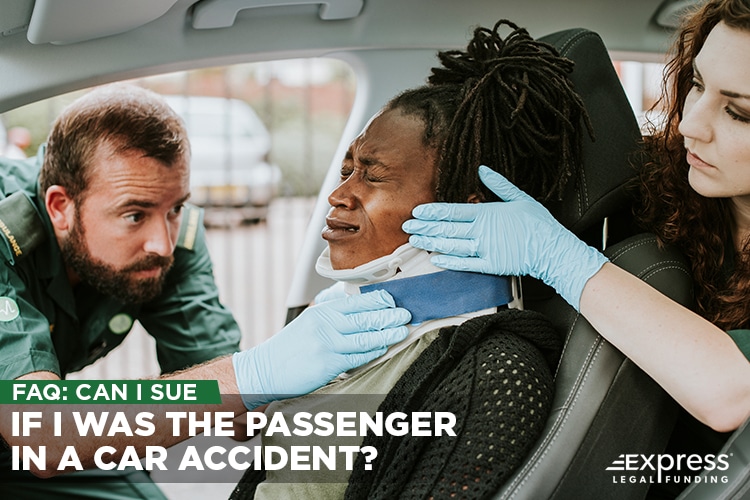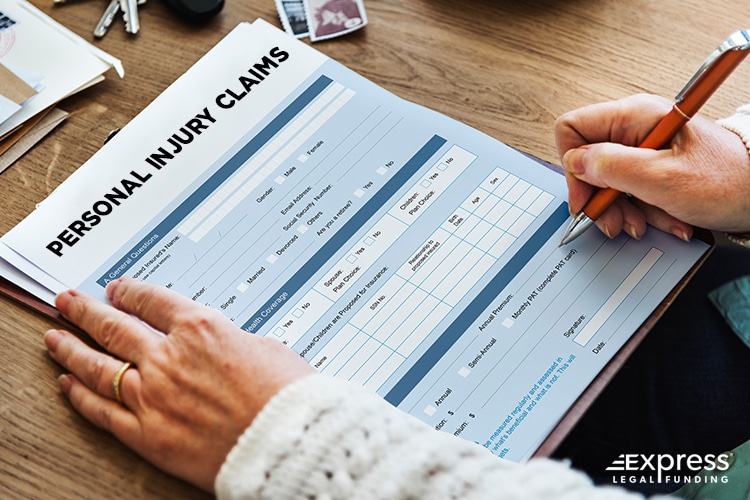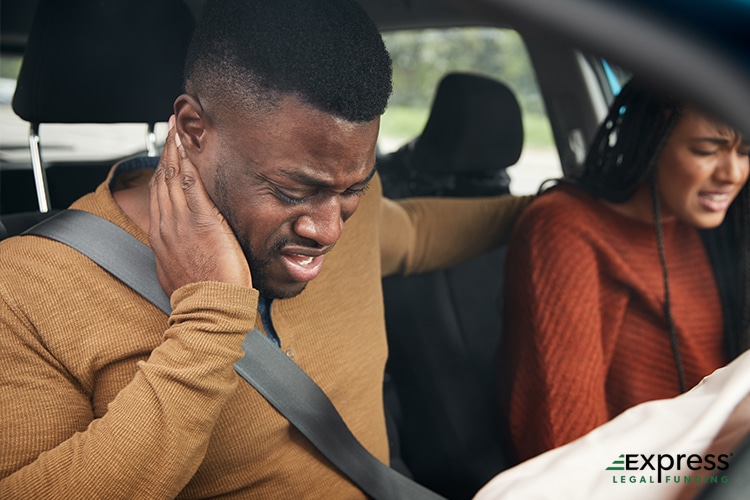
Motor vehicle accidents are horrific enough when they occur. The damage to your body, any passengers that you may have had in the car, and your vehicle could impact your quality of life for the foreseeable future. However, one position can be even more horrifying when in a motor vehicle accident—the passenger seat.
Unlike the drivers, who have a chance to act and avert the accident entirely, the passenger is helpless and utterly reliant on the driver of the vehicle to keep them safe. So, it can be terrifying when the accident happens, and you find yourself strapped to the passenger seat.
When the accident occurs, the passenger is relatively powerless. However, whether or not this powerlessness extends to the aftermath is a question everyone should ask.
With this article, we hope to provide some insight into whether or not the passenger of a vehicle involved in a motor vehicle accident has the right to file a lawsuit against the at-fault driver.
Let’s get started!
Can a Passenger File a Claim?
Personal injury claims are one of the most standard legal proceedings in the US, especially concerning motor vehicle accidents. However, the most common examples feature the vehicle driver filing a claim against another driver who negligently struck them.
This typical example has led to some misconceptions about whether or not the passenger of a vehicle involved in a motor vehicle accident has the right to seek damages against the at-fault party. The reality is that injured passengers have the right to seek out a claim but with certain caveats.
So, the answer is “yes,” passengers in car accidents have the right to file a personal injury claim. Still, depending on the region of the accident and the circumstances of the collision, there can be unique obstacles for car passengers to overcome.

Some unavoidable factors might impact your right to file a claim against the at-fault driver who caused the car accident. These circumstances will vary depending on personal circumstances or even your state. The latter is subject to change as each state governs personal injury claims according to their regulations rather than federally mandated policies.
These third-party claims can enable you to recover financially from any injuries and damages caused by these kinds of motor vehicle accidents. While there is no guarantee about how much you can get compensated for your losses from a car accident claim, it can be crucial in helping your health and bank account health recuperate following an accident injury.
With this in mind, there are certain avenues that passengers involved in motor vehicle collisions looking for compensation can use to pursue financial justice. However, as you read on, remember we seek to provide you with general information surrounding passengers involved in motor vehicle collisions and third-party claims.
We can’t know the specifics of your case and never intend to provide legal advice. As always, it’s a good idea to contact a car accident lawyer for a free legal consultation following an accident.
When you first meet with a car accident law firm, you want to provide them with all of the accurate information about the accident. Those details will include the city and state of the accident, other injured passengers, and the circumstances leading up to the accident.
You Might Be Able to File a Third-Party Claim
Despite being a passenger in the vehicle at the collision, you are still a party involved in the incident. Furthermore, if you were injured in a car crash, you likely need costly medical attention to manage any of the more intense injuries you suffered.
To that end, you might have the ability to file a third-party claim on the collision to recoup some of your losses and recover injuries and damages just like the driver of the vehicle. You would file these third-party claims separately from the driver who was victimized by the at-fault driver and would stand on its own rather than being attached to the other victim’s claim.
The third-party claim might not even be against the same person. As a third-party claimant, you can file against the policy belonging to the driver of the other vehicle or the owner of the car you were riding in.
It depends on the circumstances of who you can sue. Regardless of your claim’s target, it will be considered a third-party claim since you were injured from the incident but were not directly involved in the situation beyond being a spectator.

Let us say, for example, that the collision occurred while you were being driven someplace by a co-worker or acquaintance. The motorist makes a careless maneuver that causes a crash and leaves you injured.
Since the person driving you is at fault for the collision, you could file a claim against them for negligence and cover your medical bills, pain and suffering, expenses, and damages. This situation is opposed to the traditional claim in which you and the driver of your vehicle can file a lawsuit against the other driver if they were the one at fault.
In some rare car accident cases, you can even find yourself making multiple claims if it was a chain reaction accident or if the policy of one party is insufficient to tend to the cost of your losses. However, this would require an extremely devastating collision, and just because you file a claim does not guarantee a resolution in your favor.
It also means that both the driver who struck the vehicle and the driver of the crashed vehicle has to accept liability or be found at fault for the auto accident that injured your passengers and yourself.
Another newly classic example of a third-party claim involves filing against the liability insurance policies for transport services like Uber or Lyft. These companies have channels for covering passenger injury claims. So depending on terms and conditions, either the ride-share insurance policy maintained by the company or the driver’s insurance policy will cover the claim.
At the core of the matter is that injured passengers do have the right to seek remuneration from negligent drivers. Regardless of whether it was the other driver or the one they were riding with that was responsible for the car accident. However, keep in mind that certain circumstances can further affect your ability to file a claim.
Are You Related to the Driver?
There is a significant caveat when it comes to collisions where the person driving the vehicle you are in is a family member whom you live with. These situations mean that you are dependent on this family member or share specific financial resources that would make filing a claim as a third-party entity a non-option.
In these cases, your claim is factored into the family member’s claim. The settlement associated with the claim will account for both of you, with policy limits increased to accommodate as much.

If you are of the legal age and not necessarily dependent on the family member in question, you can file a claim against them. This option requires you not to be listed as a dependent on their auto insurance policy but remains an option if your family’s negligent driving has led to your (or your passenger’s) injury.
However, if your family member was the party at fault, things could become more complicated.
Aside from filing a potentially awkward claim against a family member, the procedure is essentially the same as those filed against strangers.
So, it can suffice as a way to recover your losses. However, there are still a few things to consider regarding your permission as a passenger involved in a collision.
Do You Live in a No-Fault State?
While personal injury cases are widespread and apply to motor vehicle accidents, they are not always an option. As we said before, every state handles these cases with its laws. Ten states currently have no-fault car insurance policies that prevent the driver of the vehicles from filing a claim in motor vehicle accidents and instead allow the driver’s own auto insurance coverage to pay for the losses and damages.
- Florida
- Hawaii
- Kansas
- Kentucky
- Massachusetts
- Michigan
- Minnesota
- New York
- North Dakota
- Utah
Additionally, New Jersey, Pennsylvania, and the District of Columbia follow a hybrid system that allows drivers and passengers to follow no-fault liability or obtain personal insurance policies that allow for fault.
However, living in these states means you generally have to rely on your motor vehicle insurance to recuperate financially from the car accident successfully.

In these cases, you submit the claim to your auto insurance company, compensating you for the losses and damages you experienced due to the collision. This applies to both the driver of the car and the vehicle passenger and occurs regardless of who was responsible for the crash occurring.
While it might seem somewhat limiting compared to the freedom of simply filing a claim, no-fault states allow auto insurance companies to cover:
- The cost of medical treatment for injuries sustained in the collision.
- Any lost income from an inability to do your job due to the collision injuries.
- The cost of services needed to replace certain essential functions, such as driving.
- The funeral or burial service cost if there was a loss of life.
With that said, even no-fault states are no stranger to personal injury lawsuits. While, ordinarily, it is not possible to file such a claim within the legal systems of these states, there are exceptions.
This requires the passenger to file a third-party claim, just as discussed above, but there are stringent prerequisites in a no-fault state like those we listed. First of all, the collision must have caused “significant” injury that corresponds to the statutes set in place by that state.
What constitutes as being a “significant” injury changes from state to state:
- For example, the definition in Minnesota requires you to have been forced to take 60 days of disability and suffered a permanent disfigurement due to injuries sustained in the collision.
- Alternatively, Hawaii defines it as the permanent loss of function of a body part and permanent disfigurement that leads to emotional distress. While there are some similarities, there is also a very distinct difference.
- In Minnesota, this threshold is any medical cost that exceeds a $4,000.00 total, whereas, in Hawaii, it is any cost that exceeds your auto insurance personal injury protection (PIP) benefit total. So, if you cultivate a medical care cost of $5,000.00 in Minnesota, you might have a case for filing a third-party claim.
The other qualifier to be able to file a third-party claim in a no-fault state is that the cost of your medical care has to exceed a certain threshold that your auto insurance might be unable to cover on its own.
Meeting these requirements enables passengers victimized by negligent driving to file a personal injury claim against the party responsible for the car accident. So, even no-fault states are aware that your auto insurance policy might not be sufficient to cover the medical expenses incurred by these types of injuries.
Closing Statements
Personal injury claims, while unfortunately common, are not a guaranteed legal option for everyone. However, while certain states might restrict your rights to such claims, your status in a car accident will not impact your ability to seek injuries and damages significantly. You might have a few extra hoops to jump through in some cases, but otherwise, you will be able to file a claim.
However, as we stated before, we do not know your unique circumstances, so we cannot advise you on the course of action you should take. Such measures and legal rights are best discussed with a car accident attorney should you decide to hire one.

Regardless of your decision, it is no secret that personal injury claims are costly. Even though you are not on the hook for paying the legal fees upfront, you have medical expenses and day-to-day costs like rent, groceries, and utility bills.
These bills and charges are not negligible on a good day and only tend to build up when dealing with serious injuries. Such expenses can be overwhelming if you find yourself juggling too many of them at once. Fortunately, at Express Legal Funding, we can help plaintiffs with their personal expenses in these cases.
We can offer you our legal funding service, so get the money you need now. You can use the pre-settlement cash advance to pay for essential costs, overdue bills, and rent payments. How it works is that we give you money now in exchange for a portion of your potential settlement or trial award. Your personal injury attorney only repays the funds after the case is resolved using the case proceeds.
So the best part being is it’s a risk-free cash advance on your claim. You only need to instruct your personal injury lawyer to repay us if you settle or win your personal injury case and not repay us directly.
So, if you need financial aid during your injury insurance claim, give us a call today. You can contact us anytime for a free consultation and a free case review to see if lawsuit funding is a good fit for you. We are here to help.
